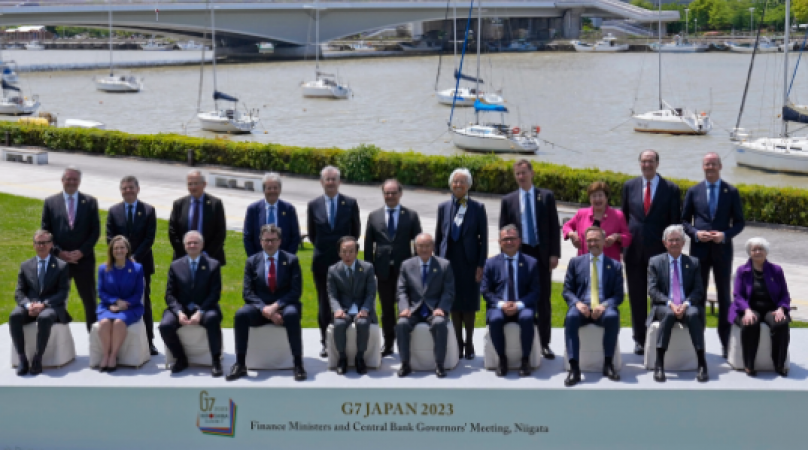
Tokyo: The Group of Seven advanced economies held financial discussions behind closed doors on Friday in Japan. Topics on the agenda included bank runs, cyber security, and improving supply chains to ensure economic security.
The G-7 is meeting this year in Japan, its only member from Asia, and a wide range of issues, including tensions with China and Russia over its war in Ukraine, are on the agenda.
However, Beijing retaliated, accusing the club of wealthy nations of hypocrisy, as G-7 finance ministers and central bank heads discussed ways to safeguard the international rules-based order and prevent what they are calling "economic coercion" by China.
Also Read: Maruti Suzuki India mulls to infuse over USD5.5 bn to double capacity by 2030
Wang Wenbin, a spokesman for the Chinese Foreign Ministry, declared on Friday that China is a victim of economic pressure.
"The United States should be criticised if any nation is guilty of economic coercion. In a routine news briefing, Wang stated that the United States has been "overstretching the concept of national security, abusing export controls, and taking discriminatory and unfair measures against foreign companies."
China claims that Washington's trade and investment restrictions, which it argues are necessary to protect American economic security, are impeding its development into a more prosperous, modern nation.
U.S. Treasury Secretary Janet Yellen stated that such measures are "narrowly targeted" and concentrated on national security prior to the start of the negotiations.
According to Yellen, the goal is not to impede China's economic development or undermine its competitiveness.
Also Read: TASI increases as trading turnover reaches $1.63 billion at the closing bell
When asked what the G-7 nations meant when they said they were attempting to stop "economic coercion," specifically from China, Yellen cited trade actions taken by Beijing against Australia as one example.
She stated that there are instances of China using economic pressure on nations to take actions that China is unhappy with from a geopolitical standpoint. The G-7 is looking to see what it can do to try to stop this kind of behaviour because "we all share a common concern with this kind of activity."
The friction over trade and its covert support for Russia has also strained China's ties with the 27-nation European Union, a member of the G-7.
Leaders present at the talks in Niigata stated that they would be thinking about ways to stop nations from getting around sanctions imposed on Moscow to make it harder for it to carry on the war.
Both the United States and the European Union insist that they are not in favour of "decoupling," or severing close economic ties with China, but rather are in favour of "de-risking" relations in order to avoid becoming overly reliant on China.
Building "robust supply chains" with low- and middle-income nations is a priority for Japan's G-7 presidency in order to reduce carbon emissions. The heavy concentration of suppliers of rare earths materials needed in many high-tech products in China is a major area of concern for all G-7 nations.
The challenge of guiding the global economy towards a sustained recovery from the pandemic while containing inflation that shot up to multi-decade highs in the past year has been made more difficult by recent bank failures in the U.S. and Europe.
Shunichi Suzuki, the finance minister of Japan, said on Thursday that it had become "clear that financial worries can spread in an instant via social networking sites, and online banking, which allows money withdrawals outside of business hours, can cause bank runs."
The pressure of interest rate increases, which make borrowing more expensive and are intended to slow business activity and cool inflation, played a significant role in the failure of Silicon Valley Bank and other lenders.
Also Read: Bahrain's economy needs to diversify, according to the industry minister
The meetings in Niigata are an excellent opportunity to "compare notes and to see how we can make the world a little bit more stable and reach the price stability that we very much want to arrive at in short order," said Christine Lagarde, president of the European Central Bank, in remarks that were videotaped and posted online.
Whether President Joe Biden and Congress will reach an agreement on raising the national debt ceiling before the U.S. government runs out of money to pay its bills hangs over the discussions among financial experts. A national debt default, according to Yellen, would be disastrous and "unthinkable."
Biden's meeting with lawmakers on the subject was postponed until May 18 to allow for staff discussions to continue over the weekend. It did not appear to signal a breakdown in negotiations, according to administration officials, who described it as a positive step.
The final ministerial meetings before the G-7 summit next week in Hiroshima are taking place in this port city on the Sea of Japan for three days.